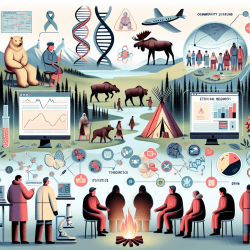Unlocking the Secrets of Alaska Native Genomic Research
In the rapidly evolving field of genomics, ensuring that all communities benefit from research advancements is crucial. A recent workshop, co-sponsored by the National Human Genome Research Institute and Alaska Native health organizations, has shed light on the unique challenges and opportunities in conducting genomic research with Alaska Native (AN) communities. This blog will explore the key outcomes and recommendations from this workshop, providing valuable insights for practitioners looking to improve their skills and engage in meaningful research partnerships.
The Importance of Community Engagement
One of the central themes of the workshop was the importance of meaningful engagement with AN tribes and tribal health organizations. Historically, AN people have been underrepresented in biomedical research, leading to a lack of trust and skepticism about the benefits of such research. The workshop emphasized the need for researchers to build authentic relationships with AN communities, focusing on transparency, reciprocity, and respect.
Challenges and Considerations
Several challenges were identified during the workshop, including mistrust based on past abuses, concerns about privacy and data ownership, and cultural considerations specific to genomic research. Participants stressed the need for researchers to understand and respect the unique cultural norms and values of AN communities. Additionally, the logistical challenges of conducting research in remote and rural areas of Alaska were highlighted, emphasizing the need for innovative solutions to overcome these barriers.
Data Sharing: A Delicate Balance
Data sharing is a critical aspect of genomic research, but it is often viewed with apprehension by communities who have had negative experiences in the past. The workshop discussions revealed that AN leaders are not opposed to data sharing but stress the importance of ensuring that any use of data is respectful and beneficial to the community. Researchers are encouraged to engage in open dialogue with AN communities to develop data-sharing guidelines that align with community values and priorities.
Opportunities for Practitioners
For practitioners looking to engage in genomic research with AN communities, the workshop offered several recommendations:
- Prioritize community engagement and relationship-building as a foundational step in the research process.
- Develop culturally appropriate research designs that align with AN health priorities and aim to produce tangible benefits for the community.
- Ensure transparency and reciprocity in data-sharing practices, and involve community members in the decision-making process.
- Leverage existing infrastructure, such as the Alaska Area Specimen Bank, to support community-driven research initiatives.
Conclusion
The insights gained from the Alaska Native Genomic Research Workshop provide a roadmap for conducting ethical and socially responsible research with AN communities. By prioritizing community engagement, respecting cultural values, and fostering open dialogue, researchers can build trust and create partnerships that benefit both the scientific community and the AN people.
To read the original research paper, please follow this link: Alaska Native genomic research: perspectives from Alaska Native leaders, federal staff, and biomedical researchers.










